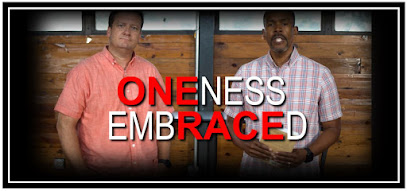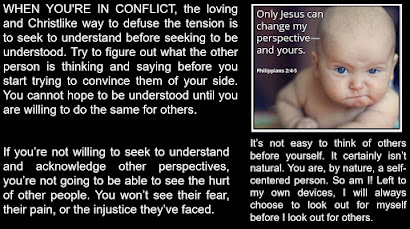Hey Gang,
Back in our old classroom
9:50AM
We are continuing in our series with the church called Oneness Embraced
Oneness Embraced by Tony Evans
Click Here to Read the Book
Hey everybody, I have purchased the ebook for you to read above, if you’d like to read along with the study - just click on the link above for the book.
Week
Two
Pastors Wayne and Alex
Teaching (FBS-UC/KLC) – Session One: Embracing Racial Oneness
9/2 @ 7pm on Facebook and
YouTube (Video above)
Discuss in Groups – Week of
9/6
We will watch Tony Evans’ Video Session One to start our lesson Sunday.
For our Group Discussion:
What
is a hard thing you’ve done before and were so glad you did?
Share
a time when you were on a great team. (sports, work, marriage, etc.). What was
wonderful about it?
Discussion
Questions:
- Dr. Evans says the goal of racial unity is not sameness, but oneness. Define “oneness.” How is it different from sameness?
- Read Ephesians 2:13-22. Dr. Evans used the analogy of the emulsifier in mayonnaise to discuss what unity means. Have you experienced real unity within diversity?
- Dr. Evans said that the church is blocking the Glory of God by its division. James 2:1-10 describes sinful discrimination in the early church that was strongly condemned. How do we consciously or unconsciously discriminate?
- In what ways is the body of Christ not “one” today?
- What is the impact to the church’s witness of not having oneness?
- Dr. Evans talked about how the Kingdom of God values our diversity more than our culture does. What does it look like to value diversity?
Reflection: How might I be blocking or advancing the
Kingdom of God?
Challenge:
Prayerfully consider conversing with someone outside this group about this
topic. It could be a spouse, a friend, coworker, or other trusted person.
Looking forward to seeing everyone!!
We love you and God Bless,
David & Susan
Teacher Notes
Embracing Racial
Oneness
FOCUS:
a) To recognize the importance of oneness,
b) to operate/live from the perspective of God’s Kingdom, and
c) to see the beauty
of ethnicities created by God.
Tony
Evans’ Video highlights:
The plague of racial divisions in the U.S. and in the Christian Church
Operating from a Kingdom perspective and agenda
Racial amalgamation vs God’s design: Not sameness but oneness
Why is unity important?
Jesus’ high priestly prayer
Solving the issue of unity by the Church
Breaking down the dividing wall
The process of emulsification
The blood of Christ as the unifying agent
For
Group Time
Discussion Questions:
Dr. Evans says the goal of racial unity is not sameness, but oneness. Define “oneness.” How is it different from sameness?
Read Ephesians 2:13-22. Dr. Evans used the analogy of the emulsifier in mayonnaise to discuss what unity means. Have you experienced real unity within diversity?
Dr. Evans said that the church is blocking the Glory of God by its division. James 2:1-10 describes sinful discrimination in the early church that was strongly condemned. How do we consciously or unconsciously discriminate?
In what ways is the body of Christ not “one” today?
What is the impact to the church’s witness of not having oneness?
Dr. Evans talked about how the Kingdom of God values our diversity more than our culture does. What does it look like to value diversity?
Self-Reflection: How might I be blocking or advancing the
Kingdom of God?
Challenge:
Prayerfully consider conversing with someone outside this group about this
topic. It could be a spouse, a friend, coworker, or other trusted person.
"We are only as strong as we are united, as weak as we are divided." JK Rowlings
"Sameness is the absence of individuality. Oneness acknowledges and harnesses diversity for the same purpose."
We Need Oneness, Not Sameness
By Chris Borah|June 5th,
2020
“We are all the same.”
This is a rallying cry we see
again and again as we sift through the wreckage of our conflicts over
differences. It’s a phrase that’s trying to take away pain, but it isn’t
telling the truth. Differences are real. Declaring that differences don’t exist
doesn’t just erase the beauty of diversity, it also offers the wrong solution
to what our problems truly are. We don’t all need to be the same. We need to be one in Christ.
Creation can be described as
the wedding, the joining together of difference. Heaven and earth, light and
dark, land and sea, male and female. Creation is diverse both within and beyond
the human community.
Our Failed, Comfortable
Answer: Sameness
The natural human answer to
the perceived problem of difference is sameness. For most of human history, we
have separated ourselves into groups, building up comfortable walls to protect
our sameness, to achieve mastery over others, and to protect ourselves from
differences. Other times we have tried to conform everyone around us into the
same image, eliminating all distinctions. Like prisoners in a jail, we lose
ourselves in the collective.
But sameness cannot resolve
our differences. The answer of Holy Scripture to the apparent problem of
difference is not sameness; the answer is oneness.
The Pentecostal Answer: Oneness
Last Sunday, many of us
gathered together to celebrate the Feast of Pentecost. We remember that fifty
days after Jesus’ resurrection on Easter Sunday, the first disciples were
gathered together in a house. Suddenly, there was the sound of a mighty rushing
wind, and they were all filled with the Holy Spirit. The Spirit of the living,
resurrected, and ascended Christ was poured out on all flesh, on all nations. The reverse of Babel happened and what drove us apart,
uncommon language, was turned backward, and everyone heard the gospel in his or
her own language.
For in one Spirit we were all
baptized into one body—Jews or Greeks, slaves or free—and all were made to
drink of one Spirit. (1 Cor 12:13)
Differences abound. Jews and
Greeks (things we can’t change). Slave and free (things we can change). When we
are ignorant of another culture’s customs it is normal for us to be frightened.
The turbulent deep teeming with sea creatures has scared mariners for ages. We
are afraid, like the disciples in the storm.
But Jesus calmed the storm. He
made peace between people of all nations by his blood. How did Jesus make us
one? By the Spirit (Eph 2:18, 22). Jesus has broken down our comfortable
dividing walls of sameness. Jesus has killed the hostility, and through him we
have access in one Spirit to God. Once we were two; now we are made one.
Once we were different and
hostile to one another. Now, we are still different, but Jesus has killed the
hostility. You cannot eat at King Jesus’ table together on Sunday and then
refuse to eat in one another’s homes on Monday (Galatians 2:11ff.). There is no
“live and let live” in the Kingdom of God. Killing our hostility with God
requires killing our hostility with one another.
Oneness Requires Difference
The family of God is not a
cult drinking the same Kool-Aid, all wearing the same robes and sneakers.
Rather, the Body of Christ is a “unity of unlikes” (C. S. Lewis, Membership), a
“fellowship of differents” (Scot McKnight). The Church is a community of unique
persons.
The answer to the problems
that arise from our difference is not to eliminate all distinctions, but to
gather at one table. Like various parts in a body, we are not the same. If the
body has more than one head, it is a monster. You don’t make an engine by
gathering together a bunch of bolts. You need nuts and bolts, pistons and
cylinders.
When you look into the face of
another person made in the image of God, you don’t say, “I don’t see color.”
White sand and rich black soil are different, but both are the dust of the
earth. Both are beautiful and different. The skin of man is beautiful and
different. Sameness is not oneness.
In the gospel, Greeks must not
become Jewish. Jews must not become pagans. But they must eat together at the
same table. In the gospel, mothers are not fathers. Children are not
grandparents. Multiple wives don’t make a happy family (ask Solomon). We need
all kinds of different and unique persons to make this family. We, the family
of God, are a “unity of unlikes.”
Family is hard and difference
is challenging. But oneness in the Spirit requires us to live with each other
in understanding ways (1 Peter 4). In the
gospel, slave and free become family (Philemon). Male and female are wed. The
fatherless are given a Father. The childless are given innumerable offspring.
The answer to the problems
that arise from our difference is not to make everyone the same. The answer to
the problems that arise from our difference is to be united in Christ. Oneness
requires difference.
What Must We Have in Common?
We try to protect ourselves by
surrounding ourselves with sameness, all dressing the same way, separating
ourselves by skin color and class and political party. We separate and sing
different songs in different keys. We know this is wrong, but our solutions are
neither realistic or ideal. Shouldn’t we all just be the same? No. Sameness
will never lead to the common good. We need variety, we must have difference if
our aim is unity.
Now there are varieties of
gifts, but the same Spirit; and there are varieties of service, but the same
Lord; and there are varieties of activities, but it is the same God who
empowers them all in everyone. To each is given the manifestation of the Spirit
for the common good. (1 Cor 12:4–7)
The song of the gospel is not
one note. The song of the gospel is many notes in the same key, in beautiful
harmony. Variety, differences of gifts, differences of service, differences of
activities produce a common good, a shared good, a beautifully diverse unity.
We are one in the Spirit, diverse in our gifts, producing our common good. In
the Spirit, variety is in harmony, and we all sing the same song:
…we hear them telling in our
own tongues the mighty works of God. (Acts 2:11)
The outpouring of the Spirit
at Pentecost was made manifest in the common proclamation of the gospel. To be
Spirit-filled requires us to proclaim the mighty works of God. And although we
proclaim the same message, each person, every mouth will tell the story in
different ways, with a different tone of voice, singing different notes in
harmony. The message of the gospel throughout Acts is diverse: tell of the
mighty works of God in creation, tell of the mighty works of God in the Law and
the Prophets, tell of the mighty works of God in the life, ministry, death, and
resurrection of Jesus of Nazareth. Many voices, one common proclamation.
Different stories, one gospel.
Every time we gather, many
different voices harmonize together in one song. On the Feast of Pentecost, on
every Lord’s Day, by the Spirit, all nations sing the same song. We share a
common liturgy with Nigerians, with Mexicans, with Canadians, with Christians
from all nations. We must not fear difference in Christ.
And they sang a new song,
saying, “Worthy are you to take the scroll and to open its seals, for you were
slain, and by your blood you ransomed people for God from every tribe and
language and people and nation (Rev 5:9)
The Creation requires
difference. The New Creation in Christ by the Spirit redeems our differences. Come
let us return to the Lord. Let us repent of our comfortable sameness. And with
many different tongues and with one voice, let us sing of the mighty works of
God.















